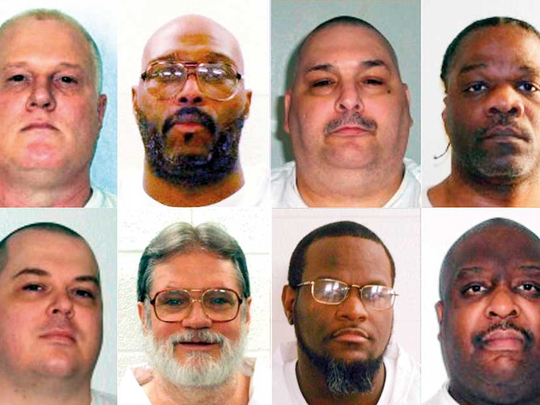
Washington: The US state of Arkansas has carried out its first execution in more than a decade despite criticism that its plan to put to death several prisoners this month is rushed.
Ledell Lee, 51, was executed on Thursday after the US Supreme Court rejected eleventh-hour requests to stay the move. He received a legal injection cocktail of three drugs, including one that has sparked sharp debate.
Another day of intense legal wrangling kept Lee, who was sentenced to death more than two decades ago, alive until just before his death warrant expired at midnight.
The nation’s top court as well as a US circuit court issued temporary execution stays as they analysed the case — but ultimately all were lifted.
“Tonight the lawful sentence of a jury, which has been upheld by the courts through decades of challenges, has been carried out,” Arkansas Attorney General Leslie Rutledge said in a statement released after the execution, the state’s first since 2005.
Three more men are currently slated to die before the end of the month. The state originally scheduled an unprecedented eight executions between April 17 and 27, but several cases are now tied up in the courts.
Arkansas’s Republican governor Asa Hutchinson has said the accelerated execution timetable is necessary as the state’s stock of a controversial sedative will expire at the end of the month.
Many of the legal clashes over Arkansas’s plan focus on use of the drug midazolam, a sedative meant to render a condemned person unconscious before other drugs induce death.
Critics say it does not always adequately sedate prisoners, potentially causing undue suffering.
Lee, who requested communion as his last meal, was administered midazolam as well as vecuronium bromide to cause paralysis and potassium chloride to stop his heart.
The use of vecuronium bromide has also faced legal pushback, with McKesson Medical-Surgical — a distributor for pharmaceutical giant Pfizer — accusing Arkansas of concealing its plans to use the drug for capital punishment. The Arkansas Supreme court ultimately allowed prison officials to administer the drug.
Lee was unresponsive during consciousness checks, according to US media, and was pronounced dead at 11.56pm, 12 minutes after receiving the lethal injection.
His fate was debated by state and federal courts in the days leading up to his death, with state authorities battling his lawyers as well as those of other death-row inmates scheduled to die this month.
Another Arkansas prisoner, Stacey Johnson — who had also been scheduled to die on Thursday — was granted a stay by the state Supreme Court on Wednesday, a reprieve that stemmed from a bid to have an evidentiary hearing connected to his request for DNA testing.
Before lifting the final temporary stay that cleared the way for authorities to execute Lee, justices on the nation’s highest bench had voted 5 to 4 — a majority that included its most recent addition Neil Gorsuch, a Donald Trump nominee — to deny staying the executions of all eight condemned inmates.
In dissenting opinions, justices noted the risks posed by midazolam and questioned the compressed schedule’s merit.
“That factor, when considered as a determining factor separating those who live from those who die, is close to random,” wrote Justice Stephen Breyer.
One of Lee’s lawyers, Nina Morrison, said the state had denied Lee — who was convicted of murdering his neighbour — from proving his innocence with DNA testing.
“While reasonable people can disagree on whether death is an appropriate form of punishment, no one should be executed when there is a possibility that person is innocent,” she said in a statement.
Arkansas’s push to reduce the number of its death-row prisoners by 20 per cent in less than two weeks has drawn sharp protests worldwide, and Lee’s execution was met with swift criticism.
“Today is a shameful day for Arkansas, which is callously rushing the judicial process by treating human beings as though they have a sell-by date,” said James Clark, a senior official of Amnesty International’s US branch.
“Arkansas is running in the opposite direction from progress. This assembly line of executions must stop.”











